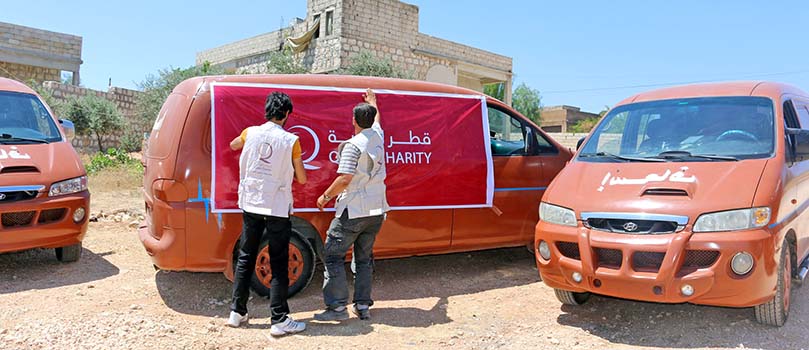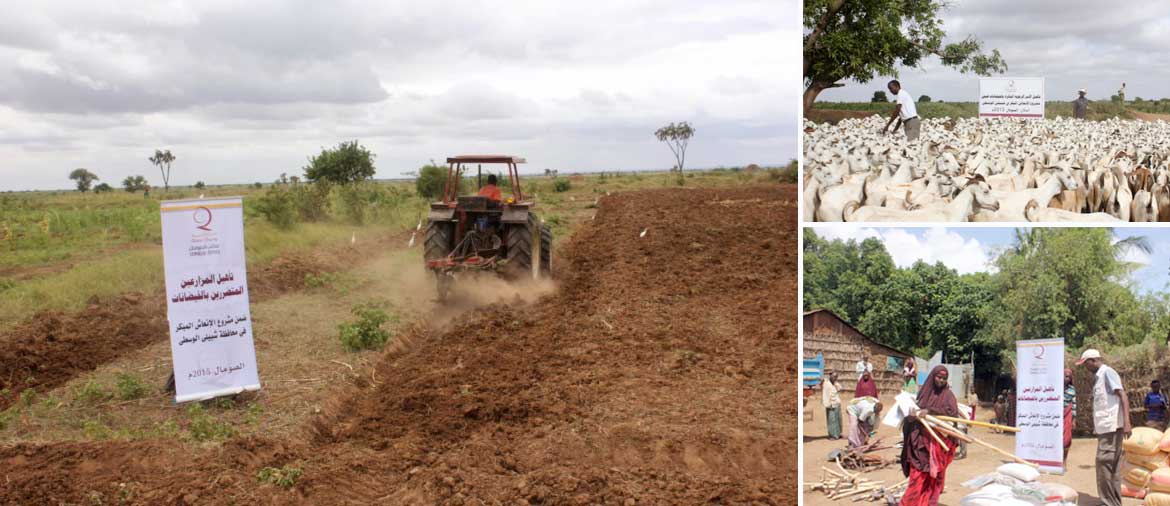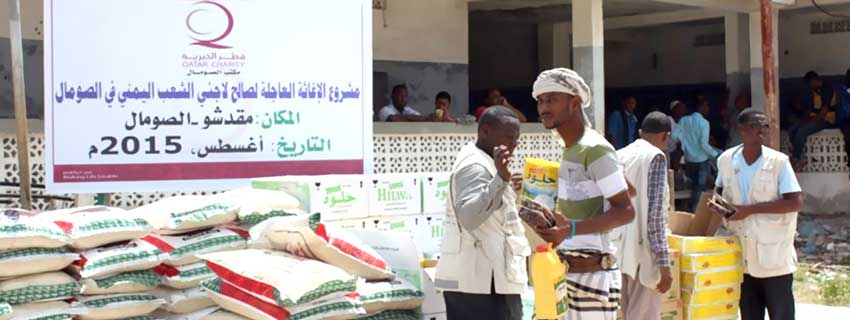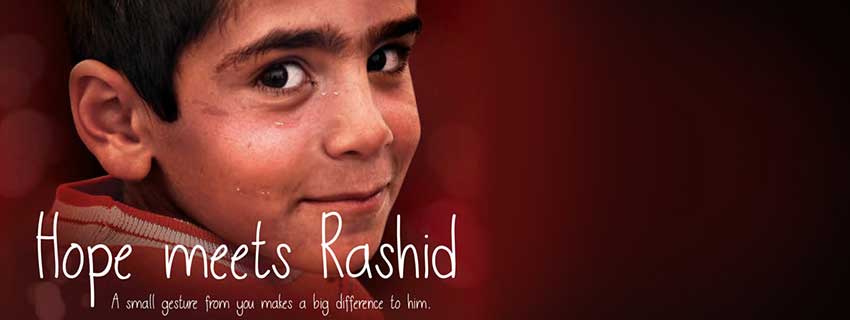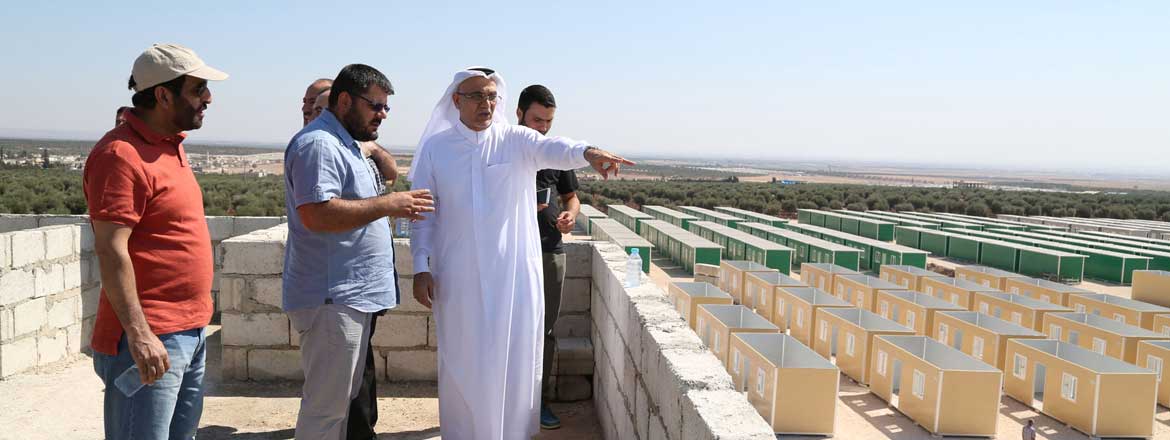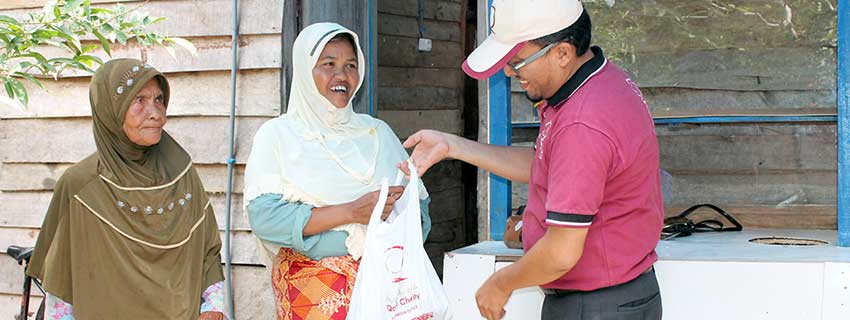QC Allocates 18,000,000 QR for the Implementation of Projects for the Syrian Refugees in Lebanon
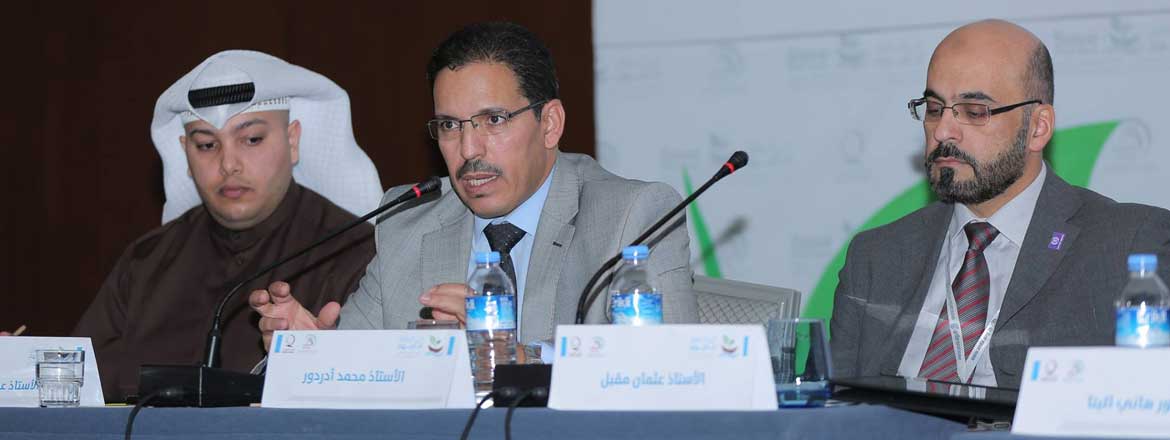
2016-02-01T12:27:51+01:00

- Al Ghamdi, "QC sponsored this project because it believes in the importance of coordinating between the active associations' efforts for the benefit of the Syrian refugees in Lebanon and in the importance of improving the outcomes of the relief work."
QC announced allocating more than 18,000,000 QR (5,000,000 USD) to support and finance the projects of the Union of Relief and Development of Associations in Lebanon, and to reinforce its partnership with acting institutions whose work is for the benefit of the Syrian refugees in Lebanon and the displaced in the territories near the Lebanon-Syria border.
Huge Audience
Mr. Mohammed Al Ghamdi, QC's CEO of International Development, was the one to announce the allocation initiative during the fourth annual conference which is held mainly to review the situation of the Syrian refugees in Lebanon. It was organized by the Union of Relief and Development Association in Lebanon and sponsored by QC in Istanbul, Turkey. The conference was held in January (21-23) and was entitled 'So Their Boats Wouldn't Drown: Syrians Torn Between Harsh Asylum and Forced Migration'. Several officials attended the conference such as General Major Mohammed Kheir, Prime Minister of the Lebanese Government; Head of the Supreme Commission for Relief in Lebanon; a number of representatives of the Ministers of the Lebanese Government; Mr. Sulaiman Al Awadhi, Director of Humanitarian Affairs at the Organization of Islamic Cooperation; Delegations from QC; High Commissioner for Refugees (UNHCR) and the UN Office for the Coordination of Humanitarian Affairs; and tens of international, Arabic and Islamic Organizations.
In the opening session of the conference, Mr. Al Ghamdi announced the allocation of 3,000,000 USD to finance and support the Union's projects. He also announced the allocation of 2,000,000 USD to reinforce partnership with any association aspiring to work with QC in coordination with the Union according to the procedures followed at QC's administration of international development.
Importance of Sponsorship
According to Al Ghamdi, QC's sponsorship of this conference, which is held for the fourth time in a row, reflects QC's commitment to its role in offering relief to the Syrian people. QC was one of the very first to respond to the Syrian people since the beginning of the crisis. QC believes in the importance of holding conferences and meetings which aim at coordinating between the active associations in order to improve the outcome of the humanitarian work.
Al Ghamdi headed the first session of the conference which was entitled "Syrians: Harsh Asylum and Migration'. During the session, Mr. Hussam Al Ghali, Humanitarian Affairs Advisor at the Relief and Development Associations Union, spoke about the current situation of the Syrian refugees in Lebanon.
The introductory statement was by Mr. Omar Khattab, CEO of Relief and Development Associations Union. He spoke about the improvement stages of the Union's work pointing out to the slogan of this year's conference which shows its aim. Its basic goal is to help and assist the Syrian refugees in Lebanon and to alleviate their sufferings now that they are left with two options only: either to go for harsh asylum or forced migration.
One of the very first speeches was the opening statement by Sheikh Ahmed Al Omari, Founder of the Union. He spoke about the establishment of the union and its continuous efforts for the coordination between active associations in relieving the Syrian refugees. He also mentioned the legitimacy it acquired from other societies and associations and the huge steps it's taken so far.
In his speech, Dr. Abdul Hafiz Eitani, Head of Boards of Directors of the Union, insisted on the importance of having a comprehensive, humanitarian vision that balances between the work on meeting the refugees' urgent relief needs and the economic and social development. "Economic and social development makes the refugees more independent. They will depend more on themselves and less on the aids. It will help so many individuals secure their needs depending solely on themselves," added he.
Conference's Papers and Workshops
The second day of the conference included holding a number of workshops. During the second session; which was about urgent relief (the procedures of making decisions and necessity for taking action); Mr. Mohammed Ardur, QC's Director of Crisis Response and Urgent Relief, presented a paper about the definition of 'urgent relief'. He emphasized on the informatic activities and quick response to reduce the impact of natural disasters and wars in terms of stopping and getting ready for them. As for Dr. Hani Al Banna, Head of the Humanitarian Forum, stressed on the refugees' need for urgent and immediate relief and the importance of allocating funds for emergencies, which is done in coordination with international parties and organizations.
In general, this year's conference discussed a group of papers which spoke about different themes such as the situation of the Syrian refugees in Lebanon, the sufferings of the refugees in Arsal, Lebanon's way of dealing with the refugees, the refugees' rights, the definition of urgent relief, the role of charity organizations in making quick decisions, the refugees' need for urgent and immediate relief, the refugees' need for independence, the donors' need for developing the refugees, the impact of development on the refugees; community and hosting country, how to enable the refugees to help themselves, group shelters (problems and solutions), camps as temporary solutions, impact of living in camps from social and cultural points of view, managing the residential camps during the crisis, impact of war on children, Syrian refugees: keeping their identities and facing the dangers of the society, impact of losing parents on children and alternate resolutions, children's rights and importance of psychological support, and drugs: their reality and psychological impact on refugees in Lebanon.
During the conference, 4 workshops were held on: joy in doing charity work, migration to Europe (pros and cons), problems facing the hosting society and the challenges they may face due to long periods of asylum, future of the new generation for the following 4 years without education and a medical workshop.
Beside the conference, the following courses were held: Relief Work to Improve Economy for the Future, the Sphere Standards and Their Application in the Field, and Role Small Development Projects in Empowering Refugees.
You can donate to support such projects through the link: Click here
Related News
QC Distributes 8 Ambulances to
QC Distributes 8 Ambulances to Hospitals inside Syria
Mr. Ibrahim Ali Abdullah, QC’s Director of Relief Department, said, “This project helps save the lives of so many injured and the lives of patients suffering from critical conditions. The ambulances are to provide first aid and to transport the patients to nearby hospitals. However, Syria is suffering from the lack of first aid services, primary health care, and surgeries. The infrastructure of the health field is falling apart! There is also a huge shortage in medical supplies, and medications inside Syria.”
QC distributed ambulances (Hyundai closed Van) to the field hospitals, and charity aid stations in many governorates. It distributed two vans to Al-Ghab plain in Hama’s countryside, two to Aleppo and its countryside, two to Idleb and its countryside, one to Jisr Al-Shughur, and one to the countryside of Lattakia. The project was implemented at a cost of 300,000 QR.
2,000 Benefiting Families:
In the same time QC implemented this project, along with other water and formation relief projects, it sprayed with pesticides a number of the Syrian refugee camps in Arsal, along the Lebanon-Syria border. It was after the temperature rose above its natural average and after the increase of insects’ bites due to the opening of manholes and their exposure to air near the camps. The project was implemented to avoid any diseases which could turn to epidemics because the refugees do not regularly check the manholes.
This initiative was carried out by QC and its associate Union of Relief and Development Associations in Lebanon. 19 camps (13 in Arsal and 6 nearby ones), where almost 2,000 families live, benefited from this project. The pesticides were sprayed on the manholes, where insects and reptiles were concentrated and where garbage was stationed. The results of this initiative were very satisfactory.
QC pays great attention to the relief of the Syrian people, whether the displaced inside or the refugees outside. 4,200,000 people benefited from QC’s projects which were implemented from April 2011 until last January (2015) at a cost of 205,000,000 QR. Since the beginning of the Syrian crisis, QC’s projects included different fields: education, health, food, and shelter. 59% of these aids were sent to inside Syria at a cost of 121,200,000 QR, while the remaining percentage was sent to the refugees in the neighboring countries. 13% of the aids (i.e. 26,889,000 QR) were sent to Jordan, 17% (i.e. 34,660,000 QR) were sent to Lebanon, 9% (i.e. 19,000,000 QR were sent to Turkey, and 2% (i.e. 3,293,000 QR) were sent to Iraq and other places where Syrians took refuge.
Earlier Projects
QC implemented a number of development and relief projects to the Syrian refugees in Lebanon and inside Syria at a cost of 14,000,000 QR (around 3,900,000 USD).
Such as l’nodamed Al-Jerah (Let’s Treat our Wounds) project: the project cost 355,000 USD, and aimed at helping support field hospitals inside Syria, Damascus countryside in specific.
Al-Sondoq Al-Tebbi (the Medical Box) project: it cost 1,200,000 USD and covered all the Lebanese territories. It sponsors the patients’ and injured surgeries whether partly or fully.
Lamset Shifa’ (Healing Touch) project: This project cost 130,000 USD. It sponsored Akkar Health Center in Al-Abda which receives the injured from inside Syria living by the Lebanese border, or living in Lebanon.
Kafalat Al-Jarha (The Injured Sponsorship) project in 24 Health Center: It was implemented in Tripoli at a cost of 190,000 USD.
The Support of the Injured and Affected project: this project was implemented in Beirut, Akkar, Tripoli, Aramoun, and Bechamoun at a cost of 250,000 USD. It and equipped and operated ambulance stations in 5 areas. It included the paramedics, ambulances, and medical devices and essentials.
It is worth mentioning that by the end of last year, QC signed a strategic, universal partnership with International Medical Corps and Qatar Foundation International. This would help amplify their capabilities to reach all the territories, worldwide, which most need aid. It would specially help the conflict-affected people in Syria, and offer health care to the displaced Syrian children who have been striving to save their lives. They strive to live because there aren’t any ordinary services available, nor is there any health care provided. In addition, the residential areas are crowded with people due to the displacement of many, and due to the damages which happened to drinking water infrastructure and the sewage system.
QC Implements Tens of Qualitat
- Hundreds of goats were distributed to the people to help them start over.
- Tens of hectares were restored for 250 families whose lands had been flooded.
As part of its early relief program to the victims of floods in the Middle Shebelle governorate in Somalia, QC implemented qualitative income-generating projects from which 400 families of the same governorate benefited.
Rehabilitation:
The projects included rehabilitation of the affected families and improvement of their life quality, in addition to supporting agriculture and shepherding. The program also included funding income-generating projects. For example, 750 goats were distributed to 150 families. Each family received 5 goats. This project was to enable them to get their ordinary lives back after the floods. The project also aimed at supporting shepherding and providing these families with a source of income that matched their previous professions.
QC has also restored agricultural lands in a total area of 250 hectares for 250 families who had worked in farming before the floods damaged their lands.
QC seeks to rehabilitate the agricultural and shepherding societies and start agricultural and shepherding businesses by supplying the workers with seeds and pesticides as well as manual cultivation instruments needed for local production. QC also helps them in their farmland restoration, and irrigation canals’ reformation. The program also supplied them with some cattle.
Terrible Immigration
The regions adjacent to the two rivers of Shebelle and Juba witnessed heavy rains in last October and November which led to the flooding of the rivers and caused a disastrous immigration of the inhabitants of the rivers’ banks. Middle Shebelle was mostly affected as most irrigation canals and flood control systems were damaged along the Shebelle River by these floods. Reports show that about 10,000 of the local inhabitants left their flooded cities, villages, and farms.
The objective QC had of the early relief project was to reach the local affected community in the governorate as it helped rehabilitate them in their crafts and professions. QC’s goal was to enable them to increase their daily income and enhance their life quality through a number of strategic projects including shops, production machinery, animals, and farmland restoration. This should facilitate their future confrontation to yearly floods. This project also seeks to restore artesian aquifers, reform schools and damaged clinics to help 93,000 people living in the region.
Tens of Thousands Beneficiaries
It is worth mentioning that QC has recently implemented various projects in Somalia including education, health, building mosques, and funding income-generating projects. Tens of thousands of Somalis around Somalia benefited from these projects. Of its construction projects in Puntland, QC inaugurated the reformation of 2 health centers and 2 preliminary schools at a cost of about 292,000 QR.
QC inaugurated the opening of 9 mosques, and 8 centers for memorization of Qur’an in 3 provinces in the north of Somalia: 3 mosques in the coastal province, 3 others in Burco, 1 in Awdal, and 2 in Hiran and Banaadir. It also built 8 centers for Qur’an memorization in Hiran, Banaadir, and Hargeisa. Thousands of Somalis shall benefit from these mosques and centers.
QC office in Somalia has also organized events of distributing sewing machines to 65 productive families in Mogadishu and Hargeisa city in Somaliland in cooperation with Jedoon Association for Woman and Child Development in Hargeisa and HINNA association in Mogadishu.
You can donate to support such projects through the link: Click here
QC Implements Relief Projects
- The aids are sufficient for the refugees and returnees for a month
- Members of the Somali Parliament and Representatives of the Yemeni community contributed in the distribution
Through its office in Somalia and as part of its relief campaign “Yemen, We are With You”, QC implemented an urgent relief project which targeted 600 families of the Yemeni refugees in Somalia and some of the Somali returnees from Yemen who are living in Mogadishu, Hargeisa, and Bosaso.
The food baskets, distributed to the beneficiaries, were sufficient for a whole month. Each family received 25 kg of rice, 25 kg of flour, 15 kg of sugar, 3 liters of cooking oil, 2.5 kg of powder milk, and 2 kg of dates.
Prominent Figures
Many prominent figures took part in the distribution of the aids to the people, including some members of the Somali parliament, and the representatives of the Yemeni community in Somalia. They all commended QC’s role in helping the Yemeni and Somali peoples.
This is one of so many other projects in which QC continues to fulfill its role in aiding and helping others. In addition, QC always makes sure that its beneficiaries are the neediest. The Yemeni people are suffering from a dire crisis which forced the families to emigrate and ask for asylum. This, of course, left the families without any living necessities.
Although Somalia is suffering from hard conditions and security issues, it became one of the countries which received the Yemeni refugees. Therefore, it is now the responsibility of those who work in charity and humanitarian fields to strengthen their efforts so that Somalia does not suffer from a critical condition, too.
130,000 Beneficiaries
130,000 beneficiaries benefited from QC’s continuous campaign ‘Yemen, We Are with You’ since the recent Yemen crisis started and until the end of last May (2015).
The food aid included 17,300 food baskets, 80 tons of flour, and 180 tons of different types of food which were distributed to the different governorates. Furthermore, 3 kitchens were prepared and equipped with foodstuff to provide daily fresh meals for 1,000 persons. Regarding healthcare, the hospitals of Aden, Ma’rib, and Taiz were supplied with some equipment, 100 first-aid bags, and a large amount of medications, and medical disposables.
In addition, 8 water tanks were distributed in Aden with the capacity of 1,000 liters. QC also distributed hundreds of mattresses and blankets to the displaced families there. Another project was funded to clean Aden Municipality in cooperation with its workers.
Call for Help
It is worth mentioning that when the Yemeni crisis started, QC appealed for help to provide 1,260,000 conflict-affected people with food, and medications.
After its appeal and as a first step, QC launched its campaign ‘Yemen, We Are with You’ to collect 36,500,000 QR (10,000,000 USD) to urgently deliver these humanitarian aids to the most affected categories.
QC also supervised the distribution of aids which Qatar sent to the people of Yemen. The aids were delivered through an air bridge from Doha to Djibouti–Ambouli International Airport following the instructions of his highness Sheikh Tamim bin Hamad Al Thani, God bless him. The aids were delivered over two days; there were 4 airplanes which carried 240 tons of different materials.
The aids were received by a delegation of QC which included Mr. Ibrahim Ali Abdullah, QC's Relief Department Director, and Mohammed Wa'i, QC's Office Director in Yemen.
QC’s field team was able to aid many conflict-affected families since the crisis first started in Aden and other Yemeni cities. They provided the families with food, drugs, and medical disposables. They sent the medical supplies to the hospitals so that they would treat the injured. The team also provided the families with food baskets and other basic and necessary items.
You can donate to support such projects through the link: Click here
Pizza Hut and QC cooperate to
Arsel Al-Amal (Send Hope) Initiative Continues to Provide School Meals to the Deprived Students in the Middle East
Pizza Hut in Qatar inaugurated “Send Hope” initiative supported by QC to provide school meals to the deprived students in the Middle East by supporting school nutrition projects of the UN’s World Food Programme.
This initiative allows Pizza Hut’s costumers, in all of its branches, in Qatar to donate to ‘School Meals’ project the amount they want. The donation is added to the costumers’ bills. With each Qatari Riyal given, a child will receive a meal at school. These children will have a better future to aspire for.
Last May, QC and WFP signed an agreement in WFP’s headquarter in Rome, Italy, to fight hunger and malnutrition, and to bolster food security worldwide. This strategic cooperation will strengthen the private sector’s role in the battle against these life-threatening challenges which threaten the lives of millions of people whether in the times of peace or conflict. These challenges also hinder the developmental efforts exerted in many countries.
Abdullah Al-Wardat, WFP’s representative and the Gulf’s Office Director, said, “We sincerely thank Pizza Hut for this great initiative which supports the Programme’s efforts to fight hunger and malnutrition by providing students with school meals in the Middle East. Our strategic cooperation with QC offers a chance to the Qatari private sector’s companies, which understand that fighting hunger and malnutrition is the primary element for their success and for the community’s stability. The companies also understand their moral duty towards the children and the country.”
In a press release, Sterling Cos’ representative, Pizza Hut franchiser in Qatar, said, “It’s our pleasure to cooperate with QC to implement “Send Hope” initiative. We hope it would help support WFP’s efforts to give meals to more than 2,600,000 needy students in the Middle East. I hope this would bring hope to their hearts; I hope it makes their lives better. Education is essential to build a bright future, especially to those with a limited income.”
Mr. Jassim Al-Mansouri, QC’s Marketing Manager, expressed his gratitude to Pizza Hut for this initiative, and expressed his happiness with this cooperation to serve the school children. He also showed his great trust in the companies of the private sector in Qatar and how sure he is that more companies will be involved in supporting such initiative. The private sector is known to be very generous and to have a sense of responsibility towards the needy communities around the world. Its efforts will stand as the practical application of the agreement which QC had signed with WFP. “Send Hope” is expected to be well received for its noble goals.
This cooperation between QC and WFP represents an opportunity for the private sector in Qatar to be more involved in supporting the fight against hunger by supporting QC’s and WFP’s campaigns for collecting financial and in-kind contributions according to the procedures of Human Appeal International. Companies are aware of the fact that by fighting hunger, ending malnutrition and bolstering food security, they can achieve success. They are also aware of the moral duty behind such battle.
QC Delegation Follows up with
- Around 70% of Al Rayyan City project was completed; the displaced Syrians living in tents will move there before winter
- Al Rayyan city comprises 10 villages; each village has 100 housing units. In addition, it has service facilities which include 30 classrooms, a mosque, a clinic, and playgrounds for children.
- The city is environmentally friendly; its lighting will depend entirely on solar energy.
- Zienal: “Our visit aims at following up with this project’s progress and making sure its implementation will be on time since QC wants to provide a shelter for thousands of displaced Syrians before winter.”
- Al Yaf’ie: “The builders of the city are 100% Syrians; and once it’s entirely constructed, its people will be its governors.”
It is expected that by the coming November, the biggest residential city, which QC implemented near the Syria-Turkey borders for the displaced Syrians, will have been built. The city can accommodate around 7,000 people, and was implemented at a cost of more than 40,000,000 QR.
In order to closely follow up with the work progress in the city, to review what was completed and what is left, a delegation from QC paid Al Rayyan city a visit. The delegation included Mr. Mohammed Abdullah Al Yaf’ie, Support Affairs CEO; and Mr. Ibrahim Zainal, QC’s Deputy Executive Director of International Development; accompanied with Urooj Hussain, Deputy Director of the Turkish International Human Relief and Humanitarian (IHH) – the party which provided the land for the project and supervised its implementation.
During the tour in the model city which QC called ‘Al Rayyan City’ for displaced Syrians, the delegation visited the housing units which were already completed. They also visited other housing units and service facilities which are under construction, including the mosque. The delegation reviewed the plan set for the completion of this huge project. They were pleased to see the completion of 70% of the project. In the meeting, the delegation emphasized the importance of working steadily so as to entirely implement the project in the coming November to secure shelters for thousands of displaced Syrians before winter.
A Tour in Al Salama Camp
At the same time of visiting Al Rayyan city, QC’s delegation visited Al Salama refugee camp for the displaced Syrians. They checked upon the Syrians’ severe circumstances and sufferings. It is also expected that some of these Syrians will be moved to Al Rayyan city once it is entirely constructed in order to provide them with a dignifying shelter.
In a press release, Mr. Zeinal said, “QC paid this field visit because it always makes sure to follow up with the work progress of its distinguished projects in general and the completion of this project in particular. All of which is to ensure a shelter for thousands of displaced Syrians before winter. To the conflict-affected Syrians, shelters top their list of priorities; which is why we hope a lot of displaced Syrian families, who are still living in tents near the Turkey-Syria borders, benefit from this project.”
In addition, Mr. Mohammed Abdullah Al Yaf’ie commended the distinguishing features of this project; the most important one is the fact that the laborers working on the project are 100% Syrians. Furthermore, this project is environmentally friendly; its lighting will depend entirely on solar energy. Finally, once the project is entirely implemented, the people of the city will be its governors.
The City’s Facilities
This model city consists of 10 villages; each village consists of 100 caravans. The beneficiary families will get a shelter with an area of around 17.5 m2, a width of 2.5 m, a length of 7 m, and a height of 2.5 m. Plus, it comprises two rooms. It can accommodate a family of 6 or 7 members. The place will be equipped with the basic needs such as mattresses, blankets, pillows, carpets, space heaters, a refrigerator, water tanks, closets, and cookware.
Al Rayyan city has several service facilities such as a mosque, 30 classrooms, several clinics, administrative offices, and playgrounds for children. A wall will be built around the city to secure its safety. The lighting will depend on solar energy, which makes the project ‘Al Rayyan City’ environmentally friendly.
This project is the outcome of a cooperation agreement between QC and IHH, which was signed in Istanbul few months earlier. Mr. Youssef bin Ahmed Al Kuwairi, QC’s CEO, and Bulent Yildirim, IHH President, signed the agreement in Istanbul, Turkey. The agreement states that QC will donate 33,000,000 QR, while IHH will donate 7,000,000 QR, and will supervise the implementation of this project.
According to the FTS of the UN’s office for the coordination of humanitarian affairs, QC was rewarded first rank universally for its aid for the Syrian people in the last three years.
The total cost of QC’s implemented projects for the conflict-affected Syrians until last March reached 240,000,000 QR from which 4,500,000 QR people benefited. 60% of these projects were implemented inside Syria. They included food, shelter, health, sponsorship and others. The rest of the projects were implemented for the Syrian refugees in the neighboring countries.
You can donate to support such projects through the link: Click here
1,000,000 People Benefit from
- 43,200 conflict-affected in Syria, 4,200 orphans’ families in Gaza, 120,000 people from different countries benefited from ‘Your Sacrifice, their Eid’ campaign
- El Kuwairi: “We thank the Qatari people for donating to our sacrifices project which made the needy of 52 countries the world over happy
Around 1,000,000 people benefited from the sacrifices campaign for the year 1436 AH which QC implemented and called ‘Your Sacrifices, their Eid’ at a cost of around 14,000,000 QR.
Mr. Youssef Bin Ahmed El Kuwairi, QC’s CEO, expressed the relief he felt because the sacrifices project was successful. QC implemented this campaign with the help of its partners in 52 countries from around the world, including Qatar. It was able to make so many needy and low-income families, who could not provide their children with meat, happy.
The affected who suffered from exceptional circumstances were prioritized such as the Syrians inside Syria, the Syrian refugees in the neighboring countries, the Gaza Strip, Yemen, Somalia, etc.
El Kuwairi said, “I am mostly thankful to those who donated for this project in Qatar, and I pray Allah that He accept their good work and reward them. Most certainly, their donations were the reason behind making the needy happy and achieving social teamwork in Qatar.”
QC had already distributed more than 28,300 sacrifices during the season, which meant 500 tons of meat in 52 countries. More than 43,200 families inside Syria benefited from the project. It was implemented in Damascus and its countryside, Idlib and its countryside, Al Rastan, Al Houla and Talbiseh in the countryside of Aleppo, in the countrysides of Hama, of Lattakia, of Daraa, and Quneitra. In addition, 4,200 orphans’ families from the Gaza Strip and 120,000 Somalis benefited from the project.
Other countries in which the project was implemented:
Palestine, the Palestinian camps abroad, Iraq, Jordan, Qatar, Tunisia, Morocco, Lebanon, Sudan, Rwanda, Uganda, Malawi, Burundi, Kenya, Ivory Coast, Djibouti, Tanzania, Mali, Togo, Nepal, India, Chad, Central Africa, Angola, Guinea Bissau, Mauritania, Yemen, Bangladesh, Benin , The Gambia, Namibia, Lesotho, Sri Lanka, Niger, Nigeria, Sierra Leone, Liberia, Congo, South Africa, Ethiopia, Burkina Faso, Senegal, Pakistan, Kyrgyzstan , Indonesia, Kosovo, Comoros Islands, Albania, the Philippines, Ghana, Bosnia, Ethiopia, and Georgia.
QC inaugurated a special campaign for pilgrimage and Eid Al Adha for this year (1436 AH). It included distributing the sacrifices inside and outside Qatar, giving people the chance to perform substitute Hajj, and distributing Eid clothing. Tens of thousands of people will benefit from this project.
The project was also implemented inside Qatar on the third and fourth days of Eid Al Adha. 2,500 sacrifices were distributed from which 12,000 people benefited, including 668 sponsored families with limited income.
Some of the Qatari volunteers helped in the distribution. In addition, QC, for the first time, offered delivery service using refrigerated cars. The sacrifices were given to the beneficiaries at their homes in Khor, Al-Shahaniya, Industrial Area (Sanaiya), and other areas inside Qatar.
This project also targeted the orphans’ and the low-income families, the indebted, the laborers, the divorced, Ramila Hospital’s inpatients, the laborers, courts, the bank, the mail, Al Qahira School, Al Cilia territory, and Abu Hamur territory and the Indian, Egyptian, Yemeni and Philippine communities.
You can donate to support such projects through the link: Click here
